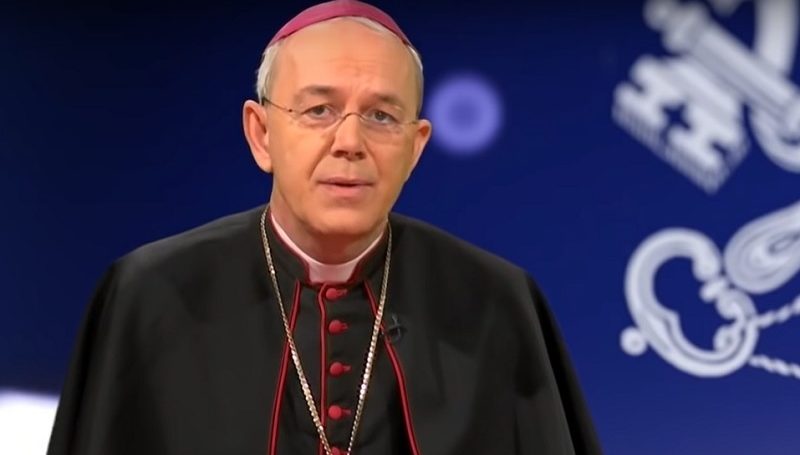Ta duchowa rana i jej bolesne konsekwencje (zarówno duszpasterskie, jak i osobiste) dla tysięcy katolików są publicznie znane. A cenne i starożytne dziedzictwo liturgiczne Kościoła rzymskiego, stanowiące dla całego Kościoła powszechne dobro duchowe, którego nie wolno utracić, jest zagrożone – pisze biskup Athanasius Schneider.
Publikujemy pełny tekst refleksji duszpasterskiej JE ks. bp. Athanasiusa Schneidera
W czasie gdy podążamy drogą prowadzącą do Synodu o synodalności w roku 2023, w Mistycznym Ciele Chrystusa pojawiła się otwarta rana. Mówimy oczywiście o duchowym cierpieniu i niesprawiedliwości, jaką wyrządzono znaczącej liczbie dobrych katolików w każdym wieku, zarówno świeckich, jak i duchownych, poprzez publikację Traditionis custodes papieża Franciszka 16 lipca 2021 r. oraz Responsa ad dubia Kongregacji ds. Kultu Bożego i Dyscypliny Sakramentów z 4 grudnia 2021 r. Przeważająca większość wiernych i duchowieństwa, która jest przywiązana do tradycyjnego rytu rzymskiego, trzyma się z daleka od polemik kościelnych i liturgicznych i szanuje zarówno papieża, jak i swoich biskupów oraz modli się za nich. Proszą oni jedynie o prawo umożliwiające im kontynuowanie pełnego przeżywania – zarówno pod względem sprawowania Mszy świętej, jak i wszelkich innych sakramentów i obrzędów – liturgicznego dziedzictwa, w którym dorastali zarówno oni, jak i pokolenia młodych katolików. Tak naprawdę Stolica Apostolska hojnym gestem duszpasterskim gwarantowała im to prawo w czasie pontyfikatów papieża Jana Pawła II i papieża Benedykta XVI.
Ta duchowa rana i jej bolesne konsekwencje (zarówno duszpasterskie, jak i osobiste) dla tysięcy katolików są publicznie znane. A cenne i starożytne dziedzictwo liturgiczne Kościoła rzymskiego, stanowiące dla całego Kościoła powszechne dobro duchowe, którego nie wolno utracić, jest zagrożone. Biskupi mają zatem obowiązek wyrazić publicznie i szczerze swoje głębokie zaniepokojenie, w zgodzie ze sposobem, do jakiego zachęca się w obecnej drodze synodalnej. W swoim przemówieniu na otwarcie drogi synodalnej z 9 października 2021 papież Franciszek powiedział: „Jeśli nie dojdziemy do tego Kościoła bliskości z postawą współczucia i czułości, nie będziemy Kościołem Pana”.
Oby papież Franciszek uświadomił sobie, że doradzono mu nierozsądnie i oby okazał duszpasterską odwagę, pokorę i prawdziwą miłość do tych marginalizowanych synów i córek Kościoła poprzez unieważnienie kanonicznych postanowień określonych we wspomnianych wyżej dokumentach. Robiąc tak, z całą pewnością podejmie działanie „lecząc rany i uzdrawiając zranione serce balsamem Boga” (Przemówienie na otwarcie synodu 9 października 2021 r.).
W tym kontekście dobrze będzie przypomnieć wielkiego świętego, który przeszedł do historii Kościoła jako prawdziwy rozjemca: św. Ireneusza z Lyonu (+202). W krytycznym momencie, kiedy pod koniec II wieku Stolica Apostolska pragnęła narzucić wyjątkowy wyraz lex orandi (odnośnie daty świętowania Wielkanocy) grupie duchowieństwa i wiernych, odrzucając w ten sposób inne prawowite tradycje liturgiczne, św. Ireneusz interweniował i z szacunkiem zganił papieża Wiktora I (+197), przypominając mu o duszpasterskiej wielkoduszności i umiarkowaniu jego poprzedników, w szczególności papieża Aniceta (+168), który mimo odmiennej perspektywy liturgicznej niż św. Polikarp (uczeń Jana Apostoła), dopuścił do niezakłóconego kontynuowania innej tradycji liturgicznej (por. Euzebiusz z Cezarei, Historia ecclesiastica V, 23). Wygląda na to, że papież Wiktor I posłuchał braterskiego apelu św. Ireneusza.
Papież Franciszek ostatnio oznajmił radosną nowinę, że planuje ogłosić św. Ireneusza doktorem Kościoła, nadając mu znaczący tytuł Doctor unitatis (Przemówienie do wspólnej prawosławno-katolickiej grupy roboczej „św. Ireneusz”, 7 października 2021 r.). Przywołując przykład św. Ireneusza, rozjemcy i przyszłego doctor unitatis, jak również przykład swoich poprzedników: Jana Pawła II i Benedykta XVI, papież Franciszek powinien wysłuchać głosu wielu dzieci, młodzieży, ojców i matek, kleryków i księży przywiązanych do starożytnych obrzędów Kościoła rzymskiego i zagwarantować ich uznane prawo do kultu zgodnie ze wszystkimi księgami liturgicznymi rytu rzymskiego, stosowanymi do ostatniej reformy liturgicznej. W ten sposób ci marginalizowani synowie i córki Kościoła poczują, że mogą, „nawet jeśli mają trudne drogi życiowe, wnosić wkład w życie wspólnoty bez przeszkód, odrzucenia czy osądzania” (Homilia papieża Franciszka w czasie Mszy św. na otwarcie synodu na temat synodalności, 10 października 2021 r.).
Papież Franciszek wezwał każdego w Kościele do tego, „by dać się poruszyć pytaniami sióstr i braci, by pomagać sobie nawzajem, aby ubogacała nas różnorodność charyzmatów” (Homilia papieża Franciszka w czasie Mszy św. na otwarcie synodu na temat synodalności). Oby Bóg obdarzył papieża Franciszka łaską, aby naprawdę był papieżem pokoju liturgicznego, szerzącym to „wszystko, co jest prawdziwe, co godne, co sprawiedliwe, co czyste, co miłe” (Flp 4,8). Jeśli papież Franciszek zadziałałby z taką miłością i duszpasterską pokorą, niczego by nie utracono – a zyskano by wszystko. A „Bóg pokoju” byłby z nim i ze wszystkimi wiernymi (por. Flp 4,9).
+ Athanasius Schneider, biskup pomocniczy Archidiecezji Najświętszej Maryi Panny w Astanie
Źródło: OnePeterFive.com
The Duty of the Roman Pontiff to Restore Liturgical Peace
A pastoral reflection
Advertisement – Continue Reading Below
As we advance along the Synodal Path leading to the 2023 Synod on Synodality, a wound has been opened in Christ’s Mystical Body, the Church. We are referring, of course, to the spiritual pain and injustice that has been inflicted on a considerable number of good Catholics of all ages, both laity and clergy, through the publication of Pope Francis’ Traditionis Custodes, on July 16, 2021, and the Responsa ad Dubia of the Congregation for Divine Worship and the Discipline of the Sacraments, on December 4, 2021. The overwhelming majority of lay faithful and clergy attached to the traditional Roman Rite keep far away from ecclesial and liturgical polemics, and they respect and pray for the Pope and for their bishops. They only ask for the right to be able to continue to live fully, both regarding the celebration of the Holy Mass and the celebration of all the other sacraments and rituals, the liturgical patrimony in which they, and generations of young Catholics, have grown up. Indeed, the Apostolic See, with a generous pastoral gesture, had guaranteed them this right during the pontificates of Pope John Paul II and Pope Benedict XVI.
This spiritual wound and its painful consequences (both pastorally and personally) for many thousands of Catholics are publicly known. And the Roman Church’s precious and entire ancient liturgical patrimony (which is a common spiritual good of the entire Church that must not be lost) is under threat. Bishops therefore have the duty to express publicly and frankly their deep concerns, in keeping with the manner being encouraged on the current Synodal Path. In his address for the Opening of the Synodal Path, on October 9, 2021, Pope Francis said: “If we do not become this Church of closeness with attitudes of compassion and tender love, we will not be the Lord’s Church.”
May Pope Francis realize that he has been ill-advised, and may he demonstrate pastoral courage, humility, and true love for these marginalized sons and daughters of the Church, by rescinding the canonical provisions stipulated in the two aforementioned documents. In so doing, he will most certainly be “bandaging wounds and healing broken hearts with the balm of God” (Address for the Opening of the Synod, October 9, 2021).
Within this context, we do well to recall a great Saint who went down in Church history as a true peacemaker: St. Irenaeus of Lyons (+202). At a critical moment in the Church’s history, when at the end of the second century the Apostolic See wished to impose a unique expression of the lex orandi (regarding the date to celebrate Easter) on a group of clergy and faithful, thus rejecting other legitimate liturgical traditions, St. Irenaeus intervened and respectfully remonstrated with Pope Victor I (+197), reminding him of the pastoral magnanimity and moderation of his predecessors, especially that of Pope Anicetus (+168), who despite having a liturgical perspective different from St. Polycarp (a disciple of the Apostle John), nevertheless allowed another liturgical tradition to continue undisturbed (cf. Eusebius of Caesarea, Historia ecclesiastica V: 23). Pope Victor I seems to have listened to the fraternal appeal of St. Irenaeus.
Pope Francis recently announced the joyful news that he plans to proclaim St. Irenaeus a Doctor of the Church, with the significant title Doctor unitatis (Address to the Saint Irenaeus joint Orthodox–Catholic Working Group, October 7, 2021). Recalling the example of St. Irenaeus, the peacemaker and future Doctor unitatis, as well as that of his predecessors John Paul II and Benedict XVI, Pope Francis should listen to the voice of the many children, young people, fathers and mothers, seminarians, and priests attached to the Roman Church’s ancient rites and guarantee their established right to worship according to all the liturgical books of the Roman Rite that were in use until the recent liturgical reform. In this way, these marginalized sons and daughters of the Church will feel that they are “part of the life of the community without being hindered, rejected or judged” (Homily of Pope Francis at the Holy Mass for the Opening of the Synodal Path, October 10, 2021).
Pope Francis has called everyone in the Church “to be sensitive to the questions of our sisters and brothers, to let ourselves be enriched by the variety of charisms” (Homily at the Holy Mass for the Opening of the Synodal Path). May God grant Pope Francis the grace to truly be a Pope of liturgical peace, promoting “whatever is true, whatever is honorable, whatever is just, whatever is pure, whatever is lovely” (Phil. 4:8). Were Pope Francis to act with such charity and pastoral humility, nothing would be lost—and everything would be gained. And the “God of Peace” would be with him and with all the faithful (cf. Phil. 4:8).
+ Athanasius Schneider, Auxiliary Bishop of the Archdiocese of Saint Mary in Astana

